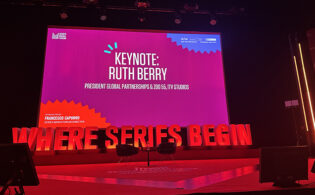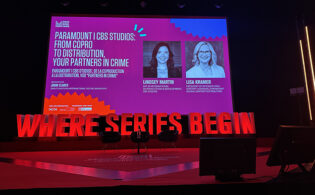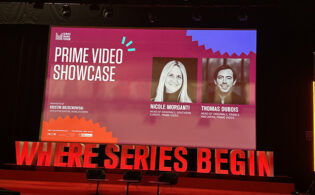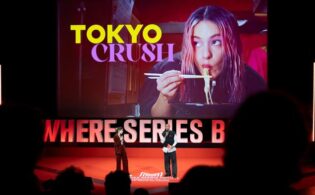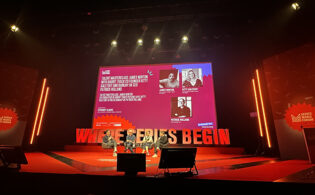This afternoon at Series Mania Forum, Cécile Frot-Coutaz, Meghan Lyvers and Nils Hartmann discussed the commissioning strategies behind Sky’s success.
The conversation opened with Frot-Coutaz, CEO of Sky Studios and chief content officer of Sky, sharing her view of the current market. “There is less product than there was two years ago, it’s fair to say, but there still probably is more than there would have been 10 or 15 years ago,” she said. “Although we all have fairly short memories, so we look at the last four or five years, I think overall, we’re probably a healthier industry in terms of what gets spent than 10 or 15 years ago.”
She continued, “There’s no question that there are some fairly sizable structural challenges that the business is facing overall, whether it’s in Europe or in the U.S. And we’re in a phase of transition, so things will settle at some point, with probably a slightly reorganized industry structure and business models. There’s some pain in the transition, and I think that’s going to continue probably for a few more years. That’s not to say we can’t make great programming in the meantime, as we’re all doing, and just focus on getting great shows on air and great shows to audiences and continuing to entertain people along the way—that’s the daily job.”
Frot-Coutaz also addressed Sky’s reworked deal with HBO, as Max makes its way to the U.K. “What’s really good about the deal that we struck is that if you’re a Sky subscriber, at no additional cost, you will have access to the Max app within your Sky platform,” she said. “So if you’re already a Sky subscriber, you have complete continuity of service. Actually, you probably have more because Max will have more content than what we have today with the HBO shows and the Warner Bros. films…. It’s going to be completely seamless for those customers, so you’ll have a really rich experience, and that’s at no additional cost.” Sky also has life-of-series rights, “so any show that we’ve had historically on our channels you’ll continue to get on the channels, including future seasons of The Last of Us and The White Lotus.”
“It doesn’t leave any holes,” added Lyvers, executive director of original scripted for the U.K. and Ireland. “It just leaves the very clear indication that we will continue to build a slate and the notion of the business wanting more originals because they are doing a very good job of nurturing the customers, but also bringing people into Sky. The news is: keep doing what you’re doing and keep your eye on the ambition and the quality. It is about making sure that we’re looking ahead, years and years ahead, in terms of how long it takes for us to build the tentpoles, such as The Day of the Jackal. It takes time to develop those to the quality and the execution that we are able to provide.”
In Italy, the negotiation with HBO has not yet been finalized. “Separate platform, separate negotiation,” said Hartmann, executive VP of Sky Studios Italia. “For us as Sky Italy, it’s still about being able to keep on raising the bar.”
Frot-Coutaz emphasized the importance of local shows in the Sky mix. “I’m a big believer that, as great as the U.S. shows are, audiences also like to see themselves in series,” she said. “If you look at the U.K. for 2024, out of the top ten shows that we had, eight were Sky originals and two were HBO shows. So, it’s also worth bearing that in mind. They’re fantastic shows, and yes, you want American premium series, but you also really want local content. It’s really, really important, and I think it’s going to continue to be really important.”
The conversation also touched on the state of high-end scripted in the U.K., and whether or not there’s a so-called crisis, as the press has reported as of late. “Every producer right now is feeling the pain of trying to make the most ambitious shows, but with the cost of production rising and the deals for talent not having come down in the way that people probably predicted they would,” Lyvers said. “So, we hear it, we’re aware of it, and we’re trafficking that.”
She added that there are different approaches to the economics of getting shows made, though. “For example, we can make in the same slate a level of a show like The Day of the Jackal, which requires a partner—and we’re really happy that we have Peacock in our Comcast family and partner on that as a co-production—but we can also make Sweet Pea, and that’s a very different economically built show that we made with a really great robust tax incentive in the U.K. and a healthy license fee.”
Lyvers said it then opens up the conversation as to what the ambition of a show is. “How can you creatively and editorially create these solutions that take some pressure off the budget line? Because the variables of crew rates, until somebody overhauls the tax scheme or gets the talent-deal process [under control] and looks at what is the new way to move these shows forward with different deal structures, you have to just adjust what the show should be made at. We all passionately want to make our series as much as the producers that we’re talking with and partnering with do. So, for us, it’s about what the right sizing of the budget is that can be done and still make that show. Because at the end of the day, we all want the same thing, which is to put that show out there and reach audiences and have them embrace it and then be able to bring it back. If you make a show and it becomes so expensive that you can’t bring it back, that’s a shame. It’s causing all of us to think in a more integrated, collaborative way about solutions that aren’t just about whether the show is going to get made or not. I reject that; I’m an optimist, and probably because I started on the producing side, I don’t accept that. So, let’s figure out what we can do together in a different way.”

